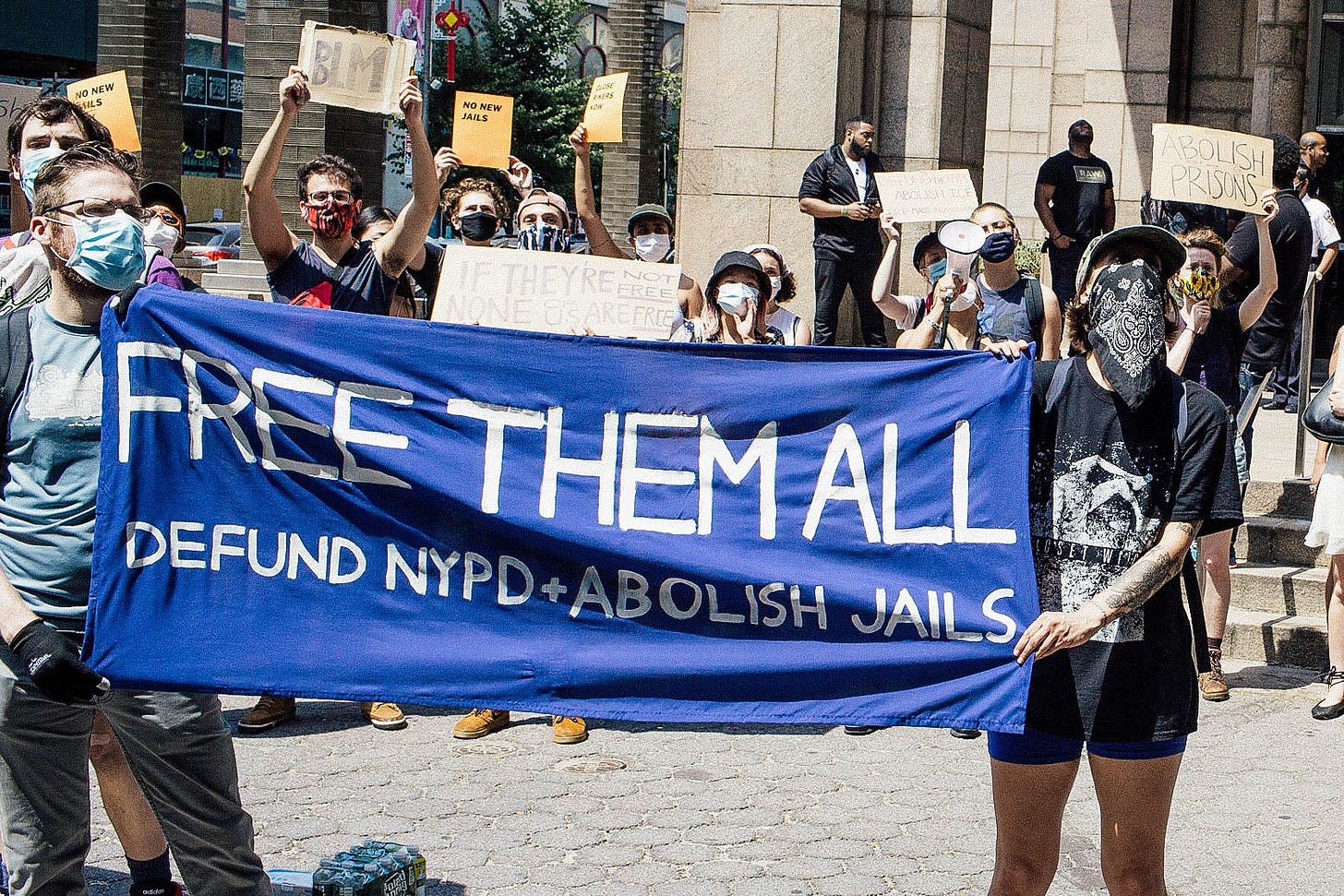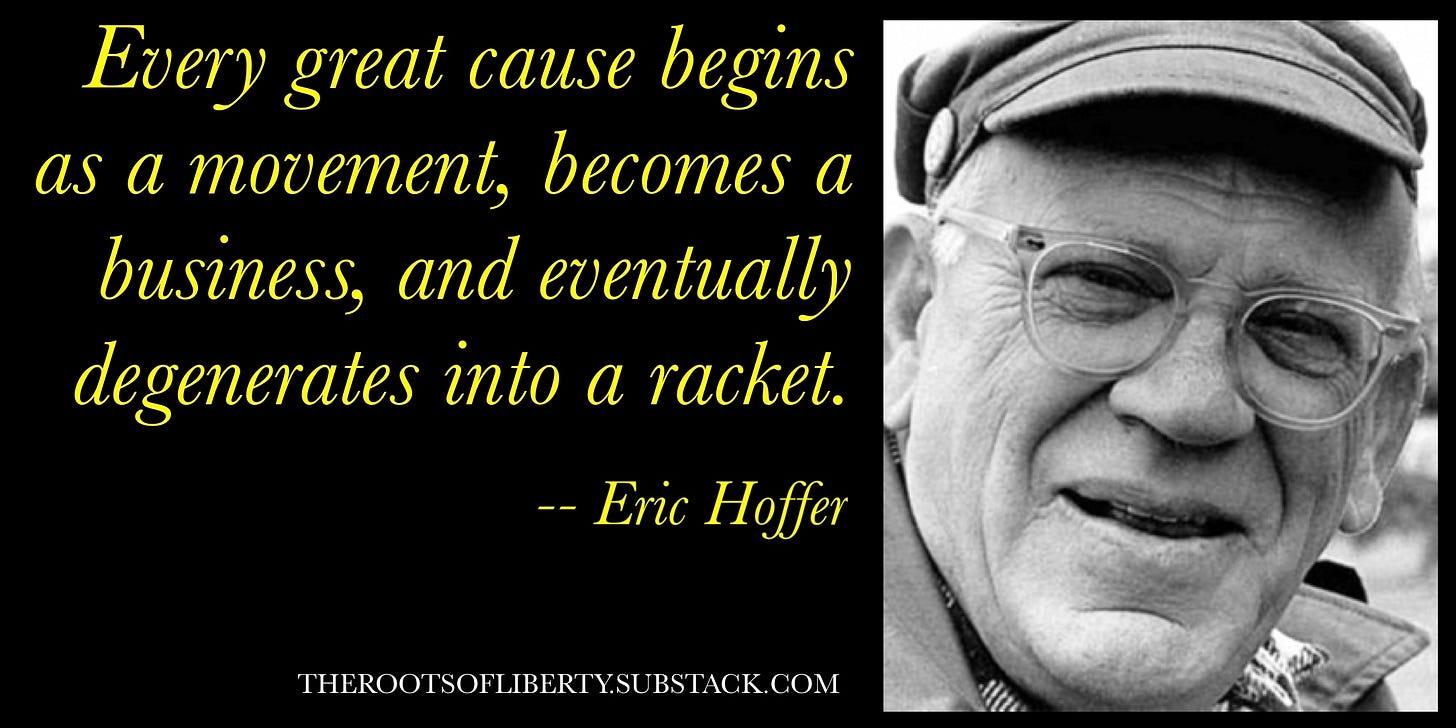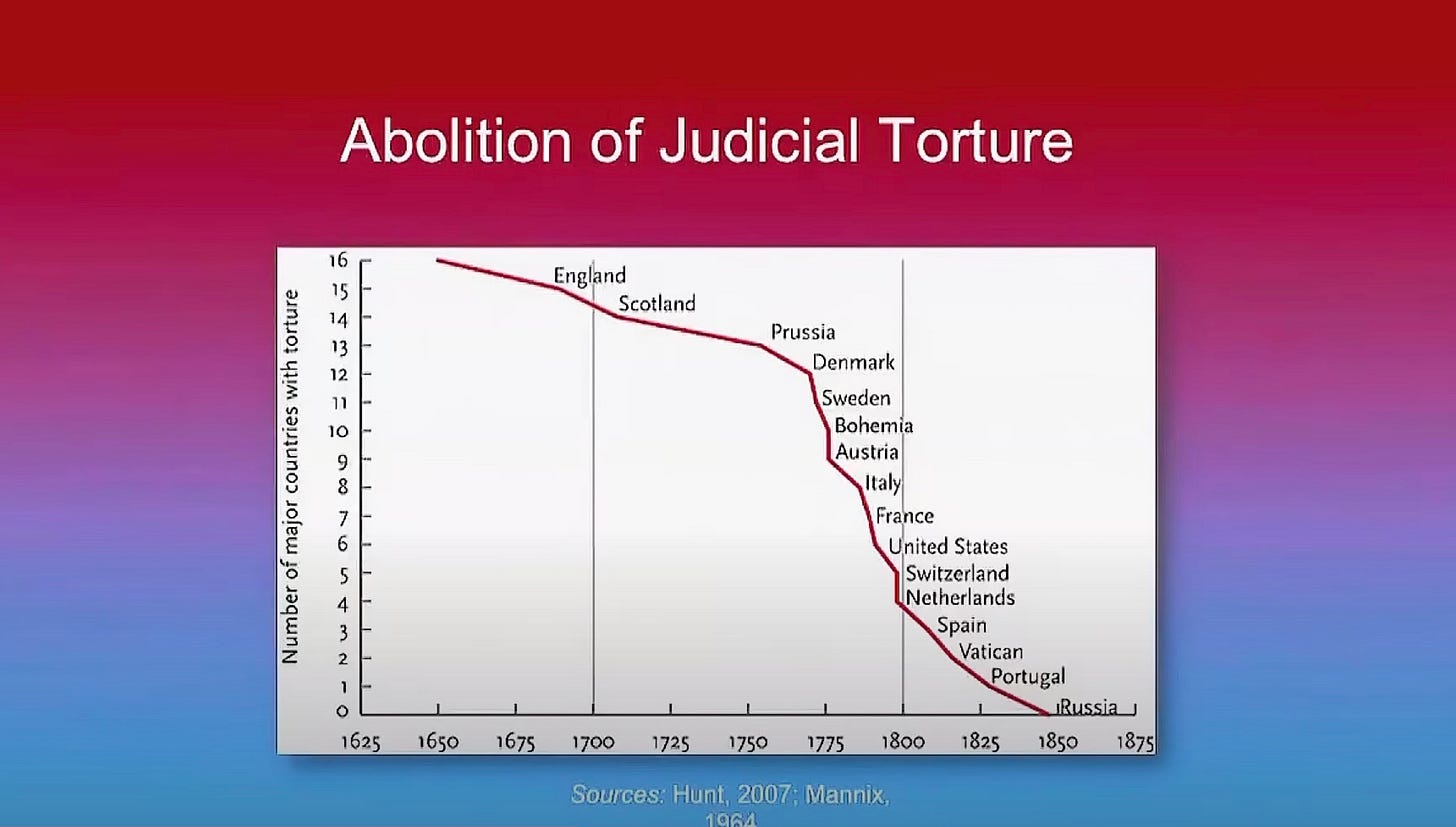Fostering Chaos
Just over two and a half years ago, the death of George Floyd under the knee of a police officer (and under the careless gaze of three other police officers) spawned national protests and demands for reforms. As I lamented at the time, the movement it spawned, Black Lives Matter, devolved into a business in barely five weeks' time, and into a racket not long thereafter.
In parallel, and often intertwined, was the Defund The Police movement (which also followed Hoffer's arc). Many asked, "if police are abolished, how will criminals be caught or punished?" The responses offered were of two varieties.
The apologists told us "no, we don't actually* want to abolish police departments, just reduce their heavy presence."
It is the second variety that lays bare the textbook equivocation that went on then. The zealots did absolutely, positively, and declaratively desire to abolish policing and close all prisons. They still do.
What of the actual criminals out there? We were and continue to be told that most of those bad acts are the result of police big footing and brutality. Once policing is gone, we are to presume, the bad people will stop doing bad things. With the help, of course, of social programs funded by all the money currently being spent on law enforcement and incarceration.
Sound like a cash grab to you? Yeah, me too.
Need I remind you that it's always about Other People's Money?
I said to myself, 'no, they couldn't possibly believe that social workers armed with platitudes, hugs, and woke-psychology would make crime go away.' So I rooted around just a bit in the Internet. Lo and behold, this is exactly what many are peddling, and when questioned, one of the stock answers is that the whole thing is a construct, and in particular that the prison system of today is a very recent invention.
That may very well be the case. Answers such as that, and those who offer them are however, often guilty of sins of omission, deflection, misdirection. By leaving out the "what did this system replace" question, they leave a void that we might be inclined to fill with a notion favorable to their point of view.
That is, of course, exactly what happens when they preach to the converted. The rest of us, playing in their sandbox, are often silenced either by incredulity or by a lack of at-hand information.
How many know that early eighteenth century England had 222 capital offenses, most of them for nonlethal crimes, codified in law? Offenses such as “poaching, counterfeiting, robbing a rabbit warren," and hanging out with Gypsies were punishable by death, as Stephen Pinker notes in this video, as were "buggery, stealing hawks, highway robbery and letting out of ponds." One horrifying law prescribed the death penalty for "strong evidence of malice in a child aged 7-14." Poisoners were not only executed, they were burned alive, as were heretics. Hanging, drawing, and quartering was one form of execution (the convict was drawn and quartered while still alive, by the way) that was used as recently as 1867.
In America at the time, "theft, sodomy, bestiality, adultery, witchcraft, concealing birth, slave revolt, and counterfeiting" were capital crimes.
Where death wasn't applied, physical punishment often was. Minor stuff got you publicly shamed, somewhat more serious stuff could get you flogged. Physical punishment was common in Western societies as recently as the late 1700s.
English prisons of the 16th and 17th centuries did exist, and they were reportedly heavily populated, but such were mostly reserved for civil crimes such as unpaid debts.
The death penalty has been rapidly fading from use in the West (and I hope will cease in America sooner rather than later), and nonlethal physical punishments are (excepting some of the shit that went on at Guantanamo and, we can presume, elsewhere in the clandestine world) no longer part of American jurisprudence. In their stead, we have deprivation of freedom as the primary means of punishing people for crimes.
So, yes, the current model of incarceration is relatively new. It replaced execution, flogging, and the pillory.
Are there problems in prisons? Absolutely, and fixing those problems should be high on every politician’s list. Incarceration is, however, a far more humane and moral punishment than what preceded it.
While the assertion that prisons as we know them are a recent contrivance is factually correct, it is grotesquely misleading. We see this gimmick all the time, especially from people who seek to impose their will on the rest of us. The "build a web of bullshit from a kernel of uncontextualized fact" is how Rep. Alexandria Ocasio-Cortez built her brand and her following, by the way. She's quite good at it, and the little factlet gives her defenders what they need to swallow (and regurgitate) the whole sandwich.
An ugly metaphor, indeed, but quite apt.
The abolish-the-police-and-prisons loons are feted in the (safe, secure, and armed-guarded) halls of the Left, where the reality that people who'd violate others' rights but for an apparatus to punish them exist ad have always existed is either waved off or ignored entirely. It bears repeating - "Defund The Police" may be a squishy slogan for many, in that they don't mean it literally, but the shining stars of the movement absolutely and unequivocally do. When cornered, on conceded, "it's a process, not a goal," but in setting an insane (oops, not allowed to use that word any more) goal, they not only detach the debate from reality, they actively foment discord and division in society.
Which may be the end they really desire.
Are there problems in modern-day law enforcement? Absolutely, and I've repeatedly listed concrete and beneficial reforms that'd make a big dent in those problems. The "reformers" of BLM, DTP, and similar rackets don't want to talk about those. In part, because they'd not put money in their pockets or toward their pet rackets. And in part, because fixing the problems would put them out of work.
Chaos is an activist's bread and butter. It brings in donations, it sells books, it captures idealistic hearts and minds, and it stokes egos. This is why things never get fixed. The hard lifting that real reforms require (if it were easy, it'd have been done by now) won't be appreciated by those resistant to change, but more crucially, it's of little interest to those who are at the fore of demanding reform.
The true victims of the system's problems aren't of much interest to anyone in power, other than as suckers to be promised to ahead of elections. This is why policing-for-profit and civil asset forfeiture haven't ended. This is why it remains difficult to fire bad cops. This is why the nuisance laws that set police and communities at odds remain on the books. This is why blue walls of silence and the unions that defend the worst at the expense of the rest remain unchallenged. This is why progressive cities still treat their poor communities as revenue centers. This is why "driving while black" is still a thing.
Instead of those reforms, we have an actual embrace of low-level lawlessness. Progressive bastions such as San Francisco have turned into places no sane business would look to continue, let alone expand. The poor and minorities who would benefit most from real reforms are instead forced to deal with not only the same problems as "BGF" (Before George Floyd), they must now suffer at the hands of criminals who are emboldened by the ass-backwards changes instituted by delusional leftists. Take a look at the Left’s reforms and you’ll find they’ve most benefited actual crimes-against-others types, not the unjustly accused, the manhandled, the profiled, or the victims of crime.
It may seem odd to some that a libertarian appears to be talking the law-and-order bit. I counter that with what I've long preached is one of the core functions of government: the protection and defense of individual and property rights. This can be done well, or it can be done poorly.
As I noted here, there's a LOT of room for improvement.
Do we lock up far too many people?
Absolutely.
Does that mean we shouldn’t lock up anybody?
Only fools and con artists would assert so.
Murderers, rapists, thieves, robbers, arsonists, assaulters, and the like will not suddenly cease to be if police departments are dissolved and prisons are emptied, and I’d say that just about every low-level protestor who demands thus is one violent mugging away from recanting that fantasy. The racket’s big names, on the other hand? They’re too well protected to suffer such ignominy.
No improvement will be achieved by those prominent absolutists.
Here’s their secret: they don’t actually want any.
Thank you for reading! If you enjoy The Roots of Liberty, please subscribe (if you have already, thank you!), please hit that “like” button to let me know, please share any article you like wherever you roam the Internet, and please recommend the blog to your friends.
If you really like The Roots of Liberty and want to help keep it rolling, please consider becoming a paying subscriber here at Substack, or at a lighter level as contributor to the blog via Patreon.
Thank you, again, for your support!
Peter.





